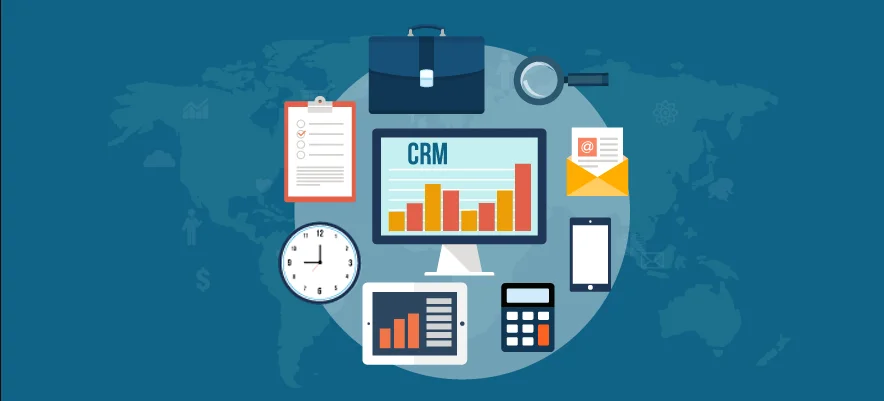With the advent of the new economy in the 21st century, small businesses are faced with many difficulties in sustaining growth and cultivating strong, long-lasting terms with customers. To improve business efficiency, small businesses have begun utilizing Customer Relationship Management (CRM) software to improve business efficiency, improve the quality of customer interaction and increase the prospect for perpetual growth.
Top 6 Benefits of CRM for Small Businesses
1. Centralized Customer Data Management
CRM software allows the collection of customer data in one location. CRM brings all customer interaction together into an easy to search database instead of scattered information across many platforms, including emails phone calls, purchases and inquiries. The centralized repository makes it possible for small businesses to build up a complete understanding of what their customers like, what they are doing, and what they need. In turn, this knowledge then goes into action helping to create personalized interactions and very targeted marketing to meet each.
2. Improved Customer Relationships
Building on the functionality provided by CRM systems, small and medium businesses can have a much closer relationship with customers. Businesses can use customer profiles and interaction histories to customize communication methods based on individual preferences or any need that customers might have. With everything from sending out personalized emails and offering current discounts to quickly handling problems, CRM allows businesses to deliver a customer experience that’s both memorable and destined to be recalled.
3. Achieving higher efficiency in sales
CRM software gives small businesses rich sales management features which enable them to simplify their selling procedure and enhance efficiency. From collecting leads and recording prospects visits to managing opportunities and conducting further analyses of each one the CRM system gives the sales team everything they need to manage their work effectively. Automated workflows and reminders ensure that all possible revenue opportunities will be followed up on: none will slip by.
4. Insightful Analytics and Reporting
Analyzing customer data and sales metrics can provide valuable insights for small business operators to identify trends in their performance or identify opportunities for actionable growth strategies. Whether it was tracking conversion rates, making sales projections, or the measurement of customer satisfaction, CRM is providing businesses with the kind of decision-making power through statistics that leads to key strategic initiatives and enables better allocation of resources thus allowing for more sustainable growth.
5. Scalability and Flexibility
As small businesses grow larger and assume different tasks, it is essential to keep scalability in mind. CRM software allows that uncertainty to be removed. It simply adapts to changing needs, facilitates smooth transitions, provides additional storage for data, and offers processing power for analyzing results…all within your business’s existing budget level or structure. When one company takes another into its family of companies-and suddenly finds another opportunity there waiting for it that it had missed before-when one variable changes, every other shifts down or up accordingly only so long as they remain relatively balanced with each other in binding factor terms too. Many organizations adopt high-calibre software solutions that can help them grow subtly with everything going smoothly; but when you suddenly discover new opportunities for establishing potentially fruitful operations everywhere inside your business.
Melding Employment tailored email marketing campaign components into existing channels to reach highly-targeted audiences should not be done with clunky software solutions. In a small business environment whether it is adding new users, customizing workflows or integrating best-of-breed third-party software applications CRM solution are all designed to facilitate expansion and innovation It ensures that small businesses can in fact scale their operations seamlessly without having large investments on technology infrastructure which ultimately choke off their rapid growth into markets or new branches due to physical limitations.
6. Cost-Effectiveness
It’s time to dispel the common misconception regarding CRM software: It is not a preserve of big businesses and their ample resources. Many vendors these days offer exclusive solutions designed specifically for small businesses, meaning that even at the high end of sophistication features fees are not necessarily astronomical. Small entrepreneurs can, therefore grow. Getting involved in CRM software is no bad deal for a small company. Operating costs can be reduced through systematic updates to products upstream. This will minimize duplication and yield incredible benefits in productivity — which equates to higher profitability. Indeed, it is very much an intelligent decision for the right kind of business.
Conclusion
Ultimately, CRM software is far from a luxury in today’s fierce market climate; rather, it serves as the lifeblood of small businesses. By gathering customer data and effectively utilizing it to improve client relations and boost sales productivity, CRM plays a crucial role in accelerating growth for small businesses. with more than a decade of continuing development behind it cannot help but bring about striking benefits. With CRM, small enterprises can expand their horizons, occupy advantageous positions, and enjoy lasting prosperity in an age that increasingly emphasizes the customer.
